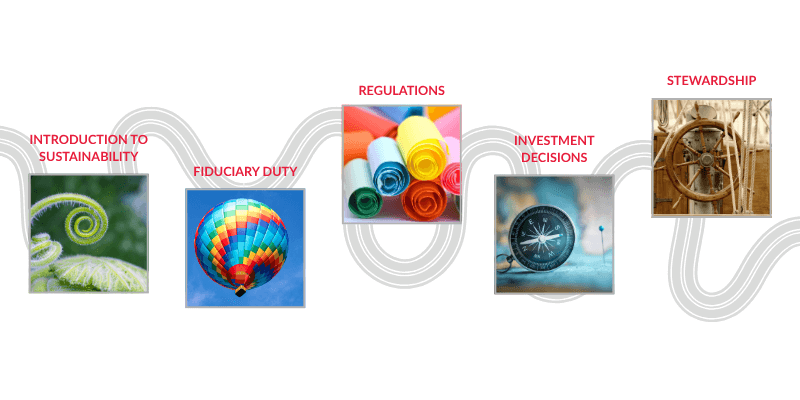Following the publication of a free introductory module on sustainability at the end of 2024, the Ethos Foundation officially launched the five modules of its basic course on the fundamentals of sustainable finance on its online education platform. These modules, which are available in three languages and last two to three hours each, are designed to help representatives from the pension sector better understand the sustainability issues that may impact on their institutions' investment policies.
Climate change, growing transparency requirements and increased expectations from policyholders. Pension funds are facing growing challenges in relation to sustainability. Thanks to the size of their assets under management, they can, individually or collectively, exert a decisive influence in helping to build a more sustainable and responsible economy.
It is against this backdrop that the Ethos Foundation has launched its continuing education programme on the fundamentals of sustainable finance. This basic course comprises five modules of two to three hours each, and is available online and in three languages (French, German and English). It allows participants to deepen their knowledge of responsible investment at their own pace.
Raising awareness of sustainability issues has been one of the Ethos Foundation's goals since its creation in 1997. “Our training courses have been specifically designed for administrators and members of the boards of trustees of pension funds”, emphasises Vincent Kaufmann, CEO of Ethos. "They aim to strengthen their skills and better equip them to understand all the financial and non-financial risks that exist today and that may have an impact on the pensions of insured people.”
These courses are designed to be practical, accessible and rooted in the realities of the financial sector. “As ESG issues multiply and transparency requirements increase, the tasks of pension funds are becoming more complex," says Cécile Biccari, head of training at the Ethos Foundation. At the same time, the emergency is becoming more acute: ten years after the Paris Agreement, the 1.5°C target seems compromised, to say the least, and the effects of climate change are increasingly being felt in Switzerland and elsewhere. “Between fiduciary duty and the need to act, continuing education for occupational pension representatives is therefore becoming an essential pillar of any responsible strategy”, she continues.
In this respect, these training courses also echo the recommendations of the Swiss Pension Fund Association (ASIP), which since 2022 has been advising its members to train their management bodies on sustainability issues in order to ensure that ESG criteria are properly and effectively embedded and ultimately implemented in their regulations or investment strategy.
The five modules at a glance:

- Introduction to sustainability: this module reviews major environmental and social trends and their implications for long-term value creation and intergenerational responsibility. It identifies potential tensions between financial, social and environmental objectives and proposes ways to address the challenges of sustainable development through investment actions and decisions.
- Fiduciary duty: this module addresses a key issue for pension funds. It examines the evolution of fiduciary duty in a rapidly changing world and provides a better understanding of how environmental and social issues now fit into the exercise of their fiduciary responsibility and how to act consistently.
- Regulation: regulations relating to sustainable finance are constantly evolving, both in Switzerland and abroad. This module provides an understanding of current and upcoming regulations. It focuses primarily on legislation in Switzerland and the European Union.
- Investment decisions: this module presents the different ways in which investors can use sustainability analysis to strengthen their investment processes, align them with their values, anticipate and manage risks arising from environmental and social issues, and enhance their impact. It enables pension funds to integrate sustainability issues into their strategic asset allocation and the selection of external managers.
- Stewardship: this module provides a better understanding of the various active ownership tools that institutional investors can use in their financial investments, in particular the exercise of voting rights at general meetings and dialogue with companies. It helps to develop a stewardship strategy tailored to the objectives and specific characteristics of pension funds.
In the coming months, Ethos will also develop additional advanced modules on specific topics related to current events (specific regulations, responsible investment initiatives, new tools, etc.), which will eventually form a library of micro-modules that users can consult according to their interests and needs. The aim is always to enable users, through this modular structure, to learn at their own pace, according to their role within an organisation and their prior knowledge.